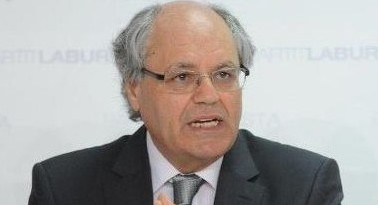 Labour MEP Edward Scicluna said increased levels of spending by government ministries in the first six months of 2012 may be the first indication that Malta will not fall in line with its budgetary targets this year.
Labour MEP Edward Scicluna said increased levels of spending by government ministries in the first six months of 2012 may be the first indication that Malta will not fall in line with its budgetary targets this year.
“We can banish the idea, hinted at by the Minister of Finance, that by the end of the year everything will fall into line as projected in our 2012 Budget,” Scicluna said, after recurrent spending by ministries during the first half of the year was 10% higher than the same period in 2011 – reaching ‘electoral’ levels of increased spending last seen in 2008.
But the MEP said it was now clear that Brussels would be intervening to rein in government spending ahead of its next budget, scheduled for October or November of 2013.
“Will the European Commission let this to happen? The answer is in the affirmative. Malta can either comply or explain if Brussels demands, but the government can of course continue with this pre-election expenditure spree in the medium-term. This would then put us back into the Excessive Deficit Procedure we were in some months ago. The repercussions will be suffered by whoever takes over the administration. Finally it is the whole country which has to pick up the tab,” Scicluna said.
The increase in spending by government ministries has reached ‘electoral’ levels last seen in 2008, with expenditure between January and June shooting up by 10% over and above the same six months in 2011.
But the EU’s so called Golden Rule, which calls on member states to have balanced budgets far smaller than the 3% deficit-GDP ratio, is supposed to stop such ‘political budgets’. “The graph shown by the MaltaToday last Sunday shows otherwise,” Scicluna said. “The question is what is the implication of all this.”
An analysis by this newspaper shows ministries and their departments were spending more money than ‘regular’ years, averaging €91 million over and above the first six months of 2011.
In the year of the ‘austerity cuts’, political instability and the Pullicino Orlando breakaway, government expenditure confirmed the established trend of increasing spending during crucial election years.
In the 2008 election year, between January and June government ministries spent 13% more than the same period in 2007. From then on, recurrent spending during this six-month period slowed down: in 2009, spending was 5.5% over the previous year; in 2010 it was 1.6%; and in 2011 spending was reduced to 0.3% below the previous year’s.
“Political budget cycles are not new,” Scicluna said. “Some of my research assistantship in Canada during the late 70s was spent estimating them for the Canadian public expenditure programmes. There is a wealth of literature which shows that these still exist in many European countries. But they are not as big or significant in each country. One notes that the more uncertain the election outcomes, especially where governments are in a coalition, the greater is the fiscal slippage.”
So far, at a total of €1.2 billion in spending between January and June, government expenditure has reached exactly 49.8% of this year’s budgeted €2.45 billion in recurrent expenditure – excluding loans made to the Greek republic and guarantees for the European Financial Stability Facility.
The target spend for 2012 is exactly €89 million more than what was spent in 2011 – €2.36 billion.
MaltaToday’s analysis excluded spending by the Office of the President, the House of Representatives, the National Audit Office, and the parliamentary Ombudsman. The latest Treasury data for the January-May period shows that the two ministries which spent the most so far are the finance ministry, where spending increased by 70%, or €34.2 million over the same period in 2011; and the health ministry, where spending increased by 20.7%, or €24.3 million – these two ministries alone accounted for two-thirds of the increased spending between January and May.
– MaltaToday, Matthew Vella : Wednesday, 1st August, 2012

